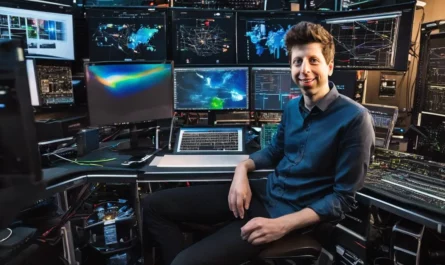OpenAI, a global force in artificial intelligence, is driven by a compelling vision: to ensure that artificial general intelligence (AGI) benefits all of humanity. Guiding this mission, a team of dedicated and exceptional individuals boldly navigating the steadily advancing realm of artificial intelligence. The board members of OpenAI embody various areas of expertise, playing a pivotal role in realizing the organization’s goals. Knowledge about these members is not only interesting to the general public but pivotal in comprehending the fabric of leadership that steers this prominent AI organization. This discussion provides a comprehensive understanding of who these members are, their roles, expertise, and how their contributions shape the objectives and the vision of OpenAI.
Understanding OpenAI’s Vision
Head into any conversation about AI and you’ll likely hear the term “OpenAI.” This organization is a big name in the world of artificial intelligence and an even bigger part of the future of technology. But what exactly is the mission of this company, and why does it matter to anyone who isn’t an AI researcher?
Imagine, if you will, a deck of cards. With a traditional deck, you know exactly what cards are in it and who holds them. Now imagine an AI deck, where cards are scientific developments and advancements. However, in the current scenario, very few hold these cards, and even fewer know how to use them best. That’s where OpenAI comes in.
OpenAI’s mission is delightfully straightforward, yet profoundly ambitious: “to ensure that artificial general intelligence (AGI) benefits all of humanity”. AGI refers to highly autonomous systems that outperform humans at most economically valuable work. It’s like having an AI that can speak any language, solve any math problem, laudably paint a masterpiece or even discern human emotions and responses.
The question, “Why does it matter?” is almost rhetorical. Humanity has always been about progress, with every invention and discovery advancing us further. However, the key aspect OpenAI is really prodding? It’s not just about broad-strokes benefits; it’s specifically about beneficial distribution.
OpenAI commits to using any influence they gain over AGI’s deployment to direct benefits for all, avoiding enabling uses of AI or AGI that may harm humanity or unduly concentrate power. In essence, they promise to be the ethical compass that guides AI development for everyone’s good, and not just a limited, powerful few.
If that isn’t enough to underscore the importance of OpenAI’s mission, there’s more! They pledge to cooperate extensively with other research and policy institutions, striving to create a global community working together to address AGI’s global challenges. It provides a framework of shared, collaborative learning, rather than a competitive scramble.
Think back to a world of open-source software. Remember how it revolutionized industry workings and offered both businesses and enthusiasts an opportunity to grow, learn, and enhance? OpenAI aims to take the same principle but apply it to something that could be even more transformative: artificial general intelligence.
In an accelerated age of technology, AI’s potential is breathtaking, to say the least. But its implications are double-edged. The same power that can change the world can also, if not checked, maybe even threaten it. In the AI world, OpenAI is the saving grace, a bastion of ethical and cooperative direction that aims to ensure that the future isn’t just technologically advanced, but also equitable, safe, and beneficial to all.

Overview of the Board Members
OpenAI, an AI pioneer with a noble mission, has a stellar board overseeing its operations and affirming its commitment towards promoting the development of artificial general intelligence (AGI) in the best interest of all humankind. Let’s get a closer look at these visionaries who are our today’s guide to the brave, new world of AGI!
First up, is Sam Altman, who holds the reins of the organization as the Chief Executive Officer. Previously, Altman served as the president of Y Combinator and the co-chair of OpenAI. His measured approach and vast experience in Silicon Valley serve as the cornerstone to propel OpenAI towards AGI benefits for the entire humanity.
Next, we have Greg Brockman, sporting a dual title as the Chairman and the Chief Technology Officer. Previous to this role, Brockman was Stripe’s founding CTO. He brings his immense technical expertise to the forefront in helping OpenAI solve complex problems in AGI development.
Elon Musk surely needs no introduction. As a founding member, though he may have stepped back from day-to-day involvements, he remains on the board, continuing to bring his disruptive mindset and forward-thinking ideas to the table. Musk’s role in Tesla’s autopilot mode and the strides SpaceX has made are testaments to his commitment toward a technologically progressive future.
Also, on the board is Ilya Sutskever. As a co-founder, Sutskever has dedicated his professional career to advancing the field of artificial intelligence. He previously led as the distinguished scientist at OpenAI and is presently involved in aiding the organization’s mission, leveraging his knowledge of the AI sphere.
Further, OpenAI is bolstered by the strategic insights of John Schulman, another co-founder. Schulman is also a research scientist. His prolific contributions to the understanding and development of AGI elevate OpenAI’s scientific ambition and help to navigate the complex landscape of AGI.
Woebot Labs CEO, Alison Darcy, further enriches the board with her passion for creating empathetic AI. As a clinical psychologist and health tech entrepreneur, she brings a unique perspective of AI’s role in healthcare and mental wellness.
Finally, yet importantly, the perspectives and expertise of Sue Yoon from Andreessen Horowitz and Saurabh Gupta, the CFO of OpenAI, complete the roundup of the diverse skills and experiences on the OpenAI board.
In their respective roles, each board member manifests the organization’s ethos – steering the development of AGI for the broader benefit of humanity. By doing so, they ensure that as AGI transforms our world; it is in the safest hands and guided in the most ethical direction. After all, we are excited about the potential of AI and AGI, but we also recognize the need for it to be developed cautiously and equitably – a philosophy OpenAI and its board live by each day.

Impact of the Board’s Decisions
Remember to consider the remarkable structure of OpenAI, which features a board of highly influential members whose decisions have significantly shaped its journey. The board’s central organ, involving individuals like CEO Sam Altman and Chairman and CTO Greg Brockman, has played a pivotal role in guiding OpenAI’s direction, crystallizing its ethos, and propelling its achievements. Their combined expertise, sound judgments, and vision have helped shape OpenAI into an organization globally recognized for its contribution to AI and AGI.
Sam Altman, with his extensive entrepreneurial and technological background, has been instrumental in driving OpenAI’s mission forward. His decisions have embodied the commitment to the beneficial and long-term safety of AGI. He has steered the emphasis on transparency, technical leadership, and cooperative approach, ensuring that OpenAI builds safe and beneficial AGI or aids others to achieve this outcome.
Under Greg Brockman’s tutorial, OpenAI has progressed exponentially. His passion for technology coupled with foresight has directed OpenAI to innovate and explore ground-breaking AI techniques. His decisions have empowered the team to push boundaries while keeping the emphasis on humanity’s benefit at the center of it all.
Elon Musk, a founding member, made huge contributions, particularly emphasizing robust caution on AGI’s impacts on society. His advocacy for a regulatory oversight for AI and his drive to ensure humanity’s survival has made OpenAI more cognizant of the ethical implications of AI and has facilitated a more cautionary approach to its development.
Co-founder Ilya Sutskever, with his deep expertise in deep learning, has emphasized the importance of technical competency in driving OpenAI’s objectives. His decisions have helped OpenAI maintain an advanced understanding of AI technologies, thereby positively influencing its strategic development and research undertakings.
John Schulman, another co-founder, has heavily influenced OpenAI’s research approach. His decisions have pushed OpenAI’s focus on long-term safety, aligning its works with research on reinforcement learning and its fundamental technical challenges.
With her expertise in digital mental health, Alison Darcy is championing empathic AI in healthcare, encouraging the board to consider empathetic response generation and reinforcement learning in AI developments. Meanwhile, Sue Yoon offers insightful advice from Andreessen Horowitz’ perspectives on technology-based solutions, inspiring the board to anticipate tech trends and adapt accordingly.
Last, but not least, OpenAI’s financial strategies have been guided by the patronage of Saurabh Gupta as the CFO. His financial acumen has helped optimize research investments to balance long-term objectives and immediate challenges, ensuring a sustainable path towards achieving OpenAI’s mission.
All together, the OpenAI board’s decisions have been monumental in shaping the organization. Their in-depth understanding and prudent decisions continue to influence how AGI evolves, with their firm resolution to ensure its benefits are broad and universal. The OpenAI board’s leadership continues to navigate uncharted territories with the beneficial distribution of AGI, guided by ethics and careful judgement to align AI with human values.

OpenAI’s board members play a critical role in guiding the organization towards the realization of its mission. Their diverse expertise and strong leadership not only form a sturdy foundation for the organization but also have a significant influence on the decisions and strategies that are executed. Their actions and decisions continue to shape the direction of the organization, upholding its commitment to ensure AGI’s benefits are shared across humanity. Scrutinizing the impacts of their decision-making processes and leadership provides invaluable insight into the organization’s journey towards its vision. Understanding this complexity is key to unpacking the future trajectory of OpenAI and the potential impact it stands to make in our societies.




